Related Research Articles
This article concerns the period 249 BC – 240 BC.
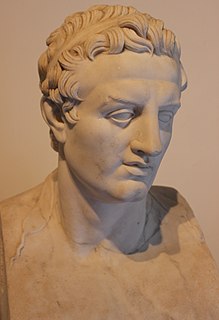
Ptolemy III Euergetes was the third pharaoh of the Ptolemaic dynasty in Egypt from 246 to 222 BC. The Ptolemaic Kingdom reached the height of its power during his reign.

Ptolemy I Soter was a companion and historian of Alexander the Great of the Kingdom of Macedon in northern Greece who became ruler of Egypt, part of Alexander's former empire. Ptolemy was pharaoh of Ptolemaic Egypt from 305/304 BC to his death. He was the founder of the Ptolemaic dynasty which ruled Egypt until the death of Cleopatra in 30 BC, turning the country into a Hellenistic kingdom and Alexandria into a center of Greek culture.
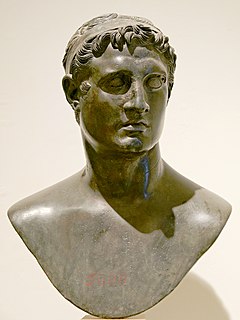
Ptolemy II Philadelphus was the pharaoh of Ptolemaic Egypt from 283 to 246 BC. He was the son of Ptolemy I Soter, the Macedonian Greek general of Alexander the Great who founded the Ptolemaic Kingdom after the death of Alexander, and queen Berenice I, originally from Macedon in northern Greece.
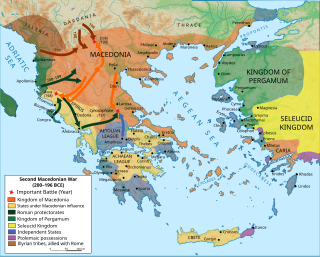
The Second Macedonian War was fought between Macedon, led by Philip V of Macedon, and Rome, allied with Pergamon and Rhodes. Philip was defeated and was forced to abandon all possessions in southern Greece, Thrace and Asia Minor. During their intervention, although the Romans declared the "freedom of the Greeks" against the rule from the Macedonian kingdom, the war marked a significant stage in increasing Roman intervention in the affairs of the eastern Mediterranean, which would eventually lead to Rome's conquest of the entire region.

The Battle of Magnesia took place in either December 190 or January 189 BC. It was fought as part of the Roman–Seleucid War, pitting forces of the Roman Republic led by the consul Lucius Cornelius Scipio Asiaticus and the allied Kingdom of Pergamon under Eumenes II against a Seleucid army of Antiochus III the Great. The two armies initially camped north-east of Magnesia ad Sipylum in Asia Minor, attempting to provoke each other into a battle on favorable terrain for several days.

The Hellenistic period covers the period of Mediterranean history between the death of Alexander the Great in 323 BC and the emergence of the Roman Empire, as signified by the Battle of Actium in 31 BC and the conquest of Ptolemaic Egypt the following year. The period of Greece prior to the Hellenistic era is known as Classical Greece, while the period afterwards is known as Roman Greece. The Ancient Greek word Hellas was originally the widely recognized name of Greece, from which the word Hellenistic was derived. "Hellenistic" is distinguished from "Hellenic" in that the first encompasses all territories under direct ancient Greek influence, while the latter refers to Greece itself.
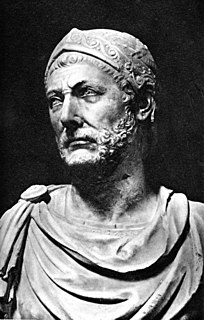
The Battle of the Eurymedon, also known as the Battle of Side took place in August 190 BC. It was fought as part of the Roman–Seleucid War, pitting the fleets of Rhodes under admiral Eudamus against a Seleucid fleet of Hannibal.

The Battle of Thermopylae took place on 24 April 191 BC. It was fought as part of the Roman–Seleucid War, pitting forces of the Roman Republic led by the consul Manius Acilius Glabrio against a Seleucid-Aetolian army of Antiochus III the Great.
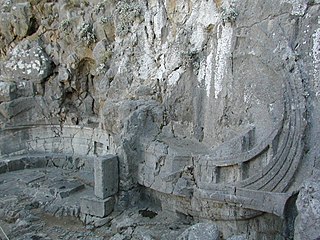
The Battle of Myonessus took place in September 190 BC. It was fought as part of the Roman–Seleucid War, pitting the fleets of the Roman Republic led by Admiral Lucius Aemilius Regillus and its Rhodian allies under Eudamus against a Seleucid fleet of Polyxenidas.
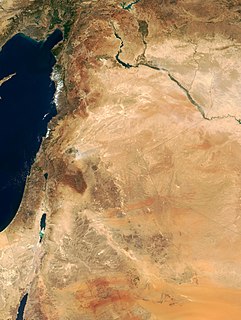
The Syrian Wars were a series of six wars between the Seleucid Empire and the Ptolemaic Kingdom of Egypt, successor states to Alexander the Great's empire, during the 3rd and 2nd centuries BC over the region then called Coele-Syria, one of the few avenues into Egypt. These conflicts drained the material and manpower of both parties and led to their eventual destruction and conquest by Rome and Parthia. They are briefly mentioned in the biblical Books of the Maccabees.

The Cretan War was fought by King Philip V of Macedon, the Aetolian League, many Cretan cities and Spartan pirates against the forces of Rhodes and later Attalus I of Pergamum, Byzantium, Cyzicus, Athens, and Knossos.

The Ptolemaic Kingdom was an ancient Hellenistic state based in Egypt. It was founded in 305 BC by Ptolemy I Soter, a companion of Alexander the Great, and lasted until the death of Cleopatra in 30 BC. Ruling for nearly three centuries, the Ptolemies were the longest and final Egyptian dynasty of ancient origin.
The Battle of Andros was an obscure naval battle during the Third Syrian War. Despite its numerical superiority, the Egyptian fleet, probably commanded by Sophron of Ephesus, lost to a Macedonian fleet led by Antigonus II Gonatas. The Egyptian captain Ptolemy Andromachou, an illegitimate half-brother of the Pharaoh, lost his ship and crew, barely escaping to Ephesus.

The Seleucid War, also known as the War of Antiochos or the Syrian War, was a military conflict between two coalitions led by the Roman Republic and the Seleucid Empire. The fighting took place in modern day southern Greece, the Aegean Sea and Asia Minor.

The League of the Islanders or Nesiotic League was a federal league (koinon) of ancient Greek city-states encompassing the Cyclades islands in the Aegean Sea. Organized under the auspices of Antigonus Monophthalmus in c. 314/3 BC, it remained under Antigonid control until c. 287 BC. It then passed under the aegis of the Ptolemaic Kingdom until Ptolemaic control over the central Aegean collapsed and the League was dissolved sometime in the mid-3rd century BC. The Cycladic islands reverted to independence, except for a few that passed under Macedonian control. The league was re-established under the leadership of Rhodes in c. 200 BC, and survived until c. 167 BC.

Ancient Rhodian coinage refers to the coinage struck by an independent Rhodian polity during Classical and Hellenistic eras. The Rhodians also controlled territory on neighbouring Caria that was known as Rhodian Peraia under the islanders' rule. However, many other eastern Mediterranean states and polities adopted the Rhodian (Chian) monetary standard following Rhodes. Coinage using the standard achieved a wide circulation in the region. Even the Ptolemaic Kingdom, a major Hellenistic state in the eastern Mediterranean, briefly adopted the Rhodian monetary standard.
The Ptolemaic navy was the naval force of the Ptolemaic Kingdom and later empire from 305 to 30 BC. It was founded by King Ptolemy I. Its main naval bases were at Alexandria, Egypt and Nea Paphos in Cyprus. It operated in the East Mediterranean in the Aegean Sea, the Levantine Sea, but also on the river Nile and in the Red Sea towards the Indian Ocean.
Callicrates or Kallikrates, was a fleet commander (nauarchos) of the Ptolemaic navy, who served under Ptolemy II Philadelphus during the Second Syrian War from 270 to 250 BC.

The Battle of Corycus, also known as the Battle of Kissos took place in September 191 BC. It was fought as part of the Roman–Seleucid War, pitting the fleets of the Roman Republic led by Admiral Gaius Livius Salinator and its Pergamene allies under Eumenes II against a Seleucid fleet of Polyxenidas.